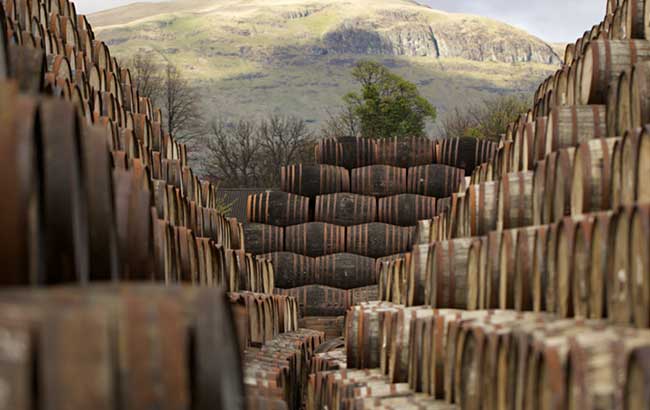This website uses cookies so that we can provide you with the best user experience possible. Cookie information is stored in your browser and performs functions such as recognising you when you return to our website and helping our team to understand which sections of the website you find most interesting and useful.
Diageo launches cask maturation project
By Alice BrookerJohnnie Walker owner Diageo has teamed up with scientists from Scottish university Heriot-Watt to investigate how whisky gets its flavour from cask maturation.

Under the three-year Knowledge Transfer Partnership, the team will figure out how to use analytical methods to explore the chemistry of whisky barrel maturation.
This will lead to the creation of a data science platform that will ‘demystify’ the process of maturation.
According to Diageo, no one has been able to ‘pin down scientifically the magic that happens inside the cask’ before.
Matthew Crow, research partnerships manager with Diageo’s global technical team, said: “Scotch is matured for at least three years and often much longer, a process that enriches and refines its flavour. However, a barrel’s potential for imparting flavour, and how the whisky will mature in that barrel involves many complex factors.
“The industry and Diageo in particular have a long history of research across whisky production, and Heriot-Watt’s scientists will help us to take our understanding of the maturation process to a new scientific level.”
The university has put together a team of experts for the project.
This includes researchers from the International Centre for Brewing and Distilling (ICBD) at Heriot-Watt, but also scientists who specialise in chemistry, physics, machine learning and data science.
Crow added: “Scotch whisky is very much a craft industry, but it has always been forward-thinking and looking for innovative ways to support its blenders and distillers.
“This project will develop a new machine learning tool, backed by huge amounts of data, that will make sure the right barrels are used for the right amount of time to produce the right flavour characteristics in a given whisky.”
Martin McCoustra is a professor at Heriot-Watt university, as well as an expert on the interaction of chemical substances with ‘complex surfaces’.
He will be coordinating the cross-disciplinary team from Heriot-Watt University.
McCoustra said: “Scientists from across Heriot-Watt University will work on this project to help answer some of the key remaining questions about how a barrel lends flavour and aroma to whisky.”
The team will start by scanning the barrels to create a visual representation of them. From this, the chemical ‘fingerprints’ of the barrels can be collected.
“These chemical fingerprints will include information on the various natural compounds that contribute to the flavour of the maturing spirit,” McCoustra continued.
“The skills of the coopers, distillers and blenders will give us a sensory evaluation of the barrel and evolving spirit.
“All this data will be used to train a machine learning system that will predict what the flavour quality of the whisky could be.
“This could significantly enhance whisky production, giving better data upon which to base fundamental decisions, such as how long a whisky should stay in a barrel.”
The project will be based at Diageo’s technical centre in Menstrie, Scotland.
“Strategic academic and industry collaborations like this will play a major role in [the Scotch whisky industry’s] continued growth and we’re pleased to work in partnership with leading companies like Diageo to explore learnings and innovations that can positively impact the global drinks sector,” said David Richardson, chief entrepreneurial executive at Heriot-Watt University.
To mark International Women’s Day (8 March), we spoke to Diageo’s global brand ambassador Jenna Ba, who highlighted a trio of women trailblazers enhancing the spirits industry across science, storytelling and community.

